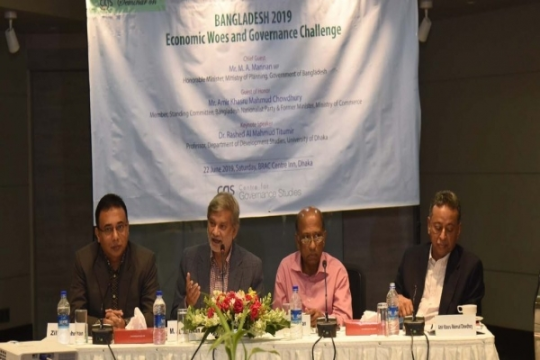Bangladesh 2019: Economic Woes and Governance Challenge
19 August 2017
s2
Centre for Governance Studies(CGS), a non-profit autonomous think-tank, organized a seminar on 19 August 2017 at the auditorium of Brac Centre Inn. The title of the seminar was “Bangladesh 2019: Economic Woes and Governance Challenge”. Politicians, academics, former diplomats, economists, business personnel, political analysts, civil society and others attended the event and stated their concern on the economics and governance challenges of Bangladesh. They noted that sustainable economic growth is required but the absence of transparency in the spending of many public funds, the defense allocation in the proposed budget, failure to ensure fair price of paddy and good governance in the country’s banking sector hindered the way to it. Professor Rashed Al Titumir, Department of development studies at Dhaka University, in his keynote speech, expressed his concern on the blurred focus on poverty, unemployment, inequality, education, and health in the proposed budget. He indicated that the country’s economy might face a stumbling block in the near future with continuity of indiscipline in the financial sector and centralization of power. The event was chaired by M Ataur Rahman, chairman of the CGS and also president of the Bangladesh Political Science Association and hosted by Zillur Rahman, Executive Director of the CGS.
Among discussants, M. A. Mannan, Planning Minister of Bangladesh, stated that the present government was successful in establishing stability and taking the mega project with the support of people. He noted that there might be some problems in the financial sector and banking sector but disagreed with others regarding the collapse of the sector. In response to Planning Minister’s statement, Amir Khasru Mahmud Chowdhury, Bangladesh Nationalist Party standing committee member, questioned about the cost and quality of mega projects, the popularity of the government as well as ‘the well-off’ condition of the banking sector. He asked for free and fair election t justify the popularity of the government. Former caretaker government adviser M Hafizuddin Khan expressed his concern on the influence of private bank owners’ association in the revision of the Bank Company Act and the cash reserve ratio. Economist Selim Jahan, also formerly a director at UNDP’s Human Development Report Department pointed out that the present trend of growth should be checked and employment opportunities should be created to have qualitative growth. Former BGMEA president Anwar-ul Alam Chowdhury opined that the new duty policy might hamper the process of industrialization. Architect Mubasshar Hussain expressed his concern about the absence of elaboration of the defense allocation and spent in the budget.
CGS vice-chairman Manjur Ahmed Chowdhury former National Board of Revenue chairman Abdul Majid, Bangladesh Institute of Development Studies fellow Nazneen Ahmed, JANIPOP chairman Nazmul Ahsan Kalimullah and former Asian Development Bank lead economist Muhammad Parvez Emdad, Leadership Studies Foundation chairman Sinha MA Sayeed, senior journalist Zahiduzzaman Faruque, former BNP MPs Sardar Sakhawat Husain Bakul and Syeda Ashifa Papri, Bangladesh Jubo Mohila League president and former MP Nazma Akhter and East West University teacher Parvez Karim Abbasi also shared their concern.
